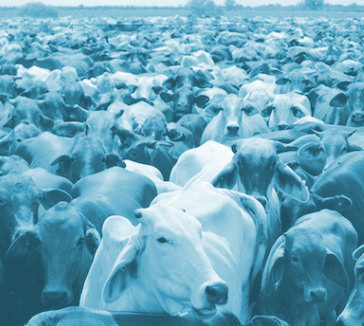Meat missed in climate plan
 Experts have criticised a new UN climate change plan that fails to account for meat-eating.
Experts have criticised a new UN climate change plan that fails to account for meat-eating.
The absence of any meat-eating reduction strategies in the United Nations' plan to combat climate change and end hunger has been described as “bewildering” in a commentary published in the journal Nature Food.
The paper adds to a broader critique of the UN Food and Agriculture Organization (FAO), particularly regarding its dismissal of alternative protein sources, such as plant-based meats, as viable options to mitigate livestock's environmental impact.
The experts expressed their concern over the FAO's lack of transparency in selecting the 120 actions it endorses in its roadmap, presented at the Cop28 climate summit in December.
The absence of a clear methodology and the exclusion of authorship details were highlighted as “concerning and surprising”.
The call for more openness in future roadmap instalments is driven by the need for recommendations to align with scientific findings, demonstrating the climate and health benefits of reduced meat consumption in affluent nations.
Despite the FAO's roadmap acknowledging the necessity for dietary changes for “human and planetary health”, its strategies fail to specifically target the reduction of meat and dairy intake in regions already experiencing unhealthy levels of consumption.
Instead, the focus has been placed on enhancing the efficiency of animal farming methods.
Cleo Verkuijl from the Stockholm Environment Institute US and co-author of the commentary, says the omission of direct measures to address meat consumption and the rejection of alternative proteins are significant oversights.
“It’s very striking: the FAO doesn’t include one of the clearest interventions that would help meet both environmental and health targets,” Verkuijl said.
The remarks are echoed in a UN Environment Programme (UNEP) report, highlighting the potential of non-animal products to considerably reduce the food system's environmental footprint.
The authors say the FAO has failed to substantiate its claim that mere adjustments in animal farming could meet climate objectives.
The commentary also criticised the FAO's apparent neglect of the “One Health” approach, which interlinks human, animal, and environmental health, despite the FAO's involvement in supporting this initiative alongside other international organisations.
In response, David Laborde, the director of the FAO's agrifood economics and policy division, notes the report's emphasis on dietary shifts.
“We stress the importance of dietary shifts from the first pages of the report, underscoring how this issue is often overlooked,” Laborde says.
“Importantly, meat is only one of the elements in the evolution of diets and limiting discussions to the meat issue is not helpful.”
While the summary report mentions dietary changes eight times, it stops short of specifically advocating for reduced meat or dairy consumption.








 Print
Print